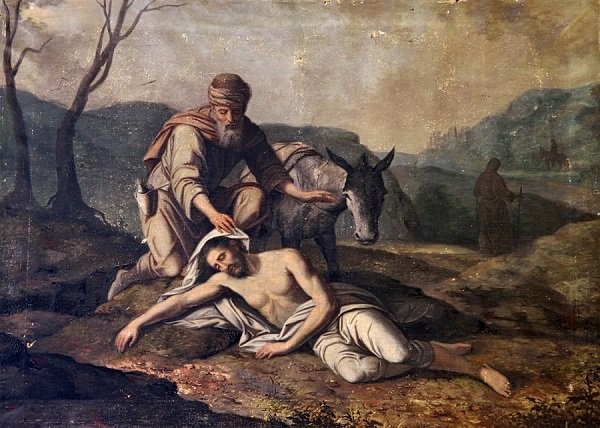The Self-Sacrifice of Love for our Neighbour
12 Νοεμβρίου 2018
Today’s Gospel reading is the well-known parable of the Good Samaritan. The immediate message of the reading is obvious- that we should aid those in distress- but the following commentary puts this teaching into context. Christ is approached by a lawyer, asked a question meant to trick Him and asks the lawyer what the law says on the subject. The Lord then goes on to narrate the parable. When He finished, He asked the lawyer which of the people involved have performed his duty to his neighbour and the lawyer replied that the Samaritan had.
‘Love your neighbour as you love yourself’ was a commandment of the Law of Moses for the Jews. The critical point, however, which was the subject of much discussion, was who you should consider to be your neighbour. According to Jewish law, the notion of ‘neighbour’ was often confused and restricted. There were some teachers of the law who even maintained that it was wrong to assist a Gentile woman in childbirth, because she’d only be giving birth to another Gentile. Loving your neighbour as you love yourself means loving them as you love your own life. As Elder Sophrony Sakharov writes, it means that the whole of humanity should live as though we all shared the same life, the same nature, though in many different persons. It follows that we must live with love for our neighbour. This is how we shall manage to reach our final destination.

The Pharisees didn’t consider the illiterate population to be their neighbours and the Essenes were an elite who declared war on the ‘sons of darkness’.
In a homily on today’s Gospel reading, Saint John Chrysostom says that the man is Adam, Jerusalem is sagacity and the state of heaven, while Jericho is the world. He calls the priest the blessed Moses and Aaron, the Levite the order of prophets and the wounds the man’s sins. The face and figure of the Samaritan are adopted by Our Lord Jesus Christ. He identifies with the Samaritan because the man behaved in a kind manner. The mixing of the oil and wine means that because He had combined divine and human nature, because He’d matched kindliness to salvation, He saved the man. The admixture of the wine and oil also denoted the union of the Holy Spirit with Christ’s blood, thus giving the man life. The bandaging of the wounds equates to the binding of the evil one and the liberation of the man from the power of the devil. The two dinars symbolize the Old and New Testaments, while the exhortation to the inn-keeper to take care of the victim means that the people who are Gentiles are to find loving attention and trust within the Church. The inn-keeper is Saint Paul, the pillar of Christians, and the two dinars are given, through Paul to the bishops, teachers and leaders in every Church.
The Church is the inn for everyone. It’s the health centre for souls and bodies, a place of recovery. The servants and doctors in the inn are those who celebrate the sacraments. The Church welcomes everyone: young, old, with or without colour, and irrespective of their particular characteristics. It doesn’t turn away those who are fornicators, are unclean, are sinners, because none of us is without sin, we’re all sinners. This is why the Fathers say that heaven is full of repentant sinners. The Church embraces everyone, because there’s room for all of us. It brings us relief through its gentle concern. It strengthens us with the sacraments. It heals us with Divine Grace, which always cures the sick and completes those who are unfulfilled.
The same command that He gave to the teacher of the law, the Lord also gives to each of us. He requests that we show love and place ourselves in the position of others. He doesn’t ask that we chat, or merely give theoretical advice, because we’re all great at doing that. No, we have to put ourselves in the position of other people, we have to make their wounds our own, taking no account of effort, sacrifice or reward. This is what Christ taught us by His example, both with regard to today’s Gospel and also the more general instruction of His life and works, as these are contained in the Holy Scriptures.
Alas, much as we talk about love, we’ve got everything else except it. We don’t have real love. If it exists, it’s to be found only in very few people. In the rest, it’s hypocritical, Pharisaical love that’s for appearances only. We can see this from our relations with the other people. You see neighbours not talking to each other, parents and children not even greeting each other. And all over nothing at all, really. In essence, you’re refusing to talk to God’s image. How will you see God’s face? And yet, we still expect salvation and paradise.
Let’s offer our love abundantly, in a simple and humble way. Let’s listen to the pain of other people and, if there’s a chance we might prove useful to them, let’s take it. We can give our love either through words or deeds. Let’s put into practice the words of Saint Paul: ‘Rejoice with those who rejoice; mourn with those who mourn’ [Rom. 12, 15].





